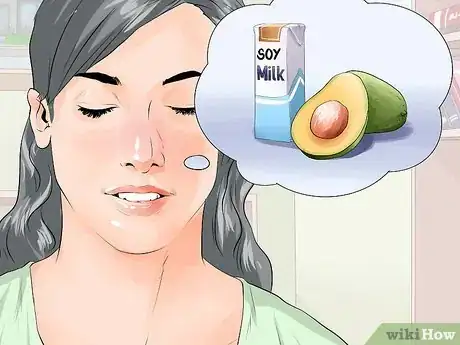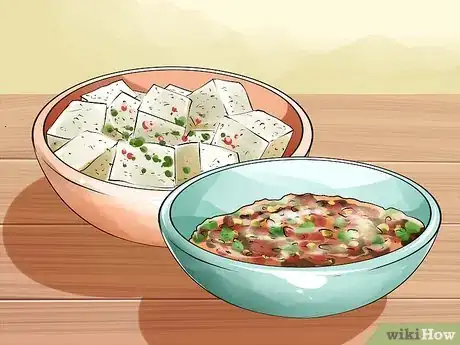This article was co-authored by Courtney Fose, RD, MS. Courtney Fose is a Registered Dietitian and Certified Nutrition Support Clinician at the University of Arkansas for Medical Sciences. She has worked as a Dietitian since 2009, and received her MS in Clinical Nutrition from the University of Arkansas in 2016.
There are 11 references cited in this article, which can be found at the bottom of the page.
This article has been viewed 46,715 times.
If you or someone you know is planning to breastfeed, it is useful to make a meal plan ahead of time. Breastfeeding while on a vegetarian diet allows the baby to experience all of the benefits of breastfeeding while allowing mom to continue a diet that is important to her. Unless there is a medical or physical reason which will alter milk production, most mothers can breastfeed successfully, even if they are on a vegetarian diet, if that is their choice. You can plan a vegetarian diet for a breastfeeding mom by preparing meals ahead of time to help ensure that mother and baby are receiving essential nutrients during this important stage.
Steps
Ensuring Proper Nutrition
-
1Consume enough calories. Just like when you are pregnant, you are eating for two when you are breastfeeding. It's very important that breastfeeding moms make sure to consume enough calories — in fact, you will need to consume more calories than you did when you were pregnant. Your body will be burning extra calories when you breastfeed, so take that into account when planning your meals. [1]
- Typically, women will need an additional 400 – 500 calories per day during the first six months of breastfeeding.[2]
- This is useful for losing pregnancy weight, but it means you need to account for the loss of calories when planning your diet.
- During the second six months of breastfeeding, you will likely burn about 400 additional calories per day.
-
2Get the right nutrients. When you are breastfeeding, it's not enough to just eat more calories — "empty" calories, or those that provide no nutritional value, should be avoided. You need to make sure that you are choosing nutrient-rich foods. You and your baby need specific nutrients in your diet to keep you both healthy.[3] [4]
- It is important to get enough protein. Sometimes, this can pose the greatest challenge for vegetarians. Aim to get about 89 grams per day. High protein foods include beans, nuts, and eggs (which many vegetarians don't eat).
- You also need to make sure to eat plenty of Vitamin B12. You can get your daily 26 mcgs by drinking milk or fortified soy milk. You can also find it in fortified cereals and yogurt.
- Breastfeeding moms need about 1,000 mgs per day of calcium.[5] Eat vegetarian dairy products, fortified orange juice, dark leafy greens, and almonds. You can get Vitamin D from these sources, too.
- Empty calories include things like cakes, cookies, pastries, soda, ice cream, bacon, hot dogs, and pizza.
Advertisement -
3Stay hydrated. It's important to drink plenty of fluids while you are breastfeeding. Make it a habit to drink whenever you are thirsty. Water is the best choice, but you can supplement that with low-sugar juices and soups. [6]
- Make sure to limit your caffeine intake while breastfeeding. Opt for caffeine free green tea instead.
- Low fat milk is also a great choice to help you stay hydrated.
-
4Continue with your supplements. It can be difficult to get the required nutrients when you are following a vegetarian diet. Continue taking your daily prenatal vitamins until you stop breastfeeding. In fact, the Mayo Clinic recommends that all women of child bearing-age take a prenatal vitamin, even if they are not planning to become pregnant.[7] Your doctor may also suggest additional supplements.
- One of the most common supplements for breastfeeding mom is Vitamin B-12. This nutrient is key to your baby's development, and is found almost exclusively in animal products.[8]
- Your doctor might also recommend a Vitamin D supplement. This is especially common if you are not able to get enough natural sunlight.
- Your baby needs Vitamin D to help him absorb calcium. A Vitamin D deficiency can cause rickets, which is a weakening of the bones.
Planning Healthy Meals
-
1Use a checklist. When you are pregnant or a new mom, you are bound to be tired and overwhelmed. That means it's even more important to have at least some of your meals planned in advance. When you have a new baby, you'll want to focus your energy on the baby, and not spend the day thinking about getting enough nutrients.
- Set aside some time at the beginning of each week to plan your meals. The government offers a very useful checklist that you can rely on. You can find checklists here: https://www.choosemyplate.gov/MyPlate-Daily-Checklist
- Choosemyplate.gov will allow you to view food choices that will supply you with the needed nutrients. You can pick some foods from each group, and the site will help you figure out which nutrients you're getting and which you still need.
-
2Plan for multiple meals per day. It is important that you eat frequently while you are breastfeeding. As a new mom, you may find that you don't have time to sit down for a large meal. This means that you need to make sure to eat several smaller meals to ensure that you are getting enough calories for you and your baby each day.
- Try to eat three regularly sized meals and three between meal snacks per day.
- Even if you are at home with your baby, try packing a lunch as if you were going to work. Then you will have a meal you can just grab and eat as needed.
- Have plenty of snacks prepared. The ones you can eat with one hand are best, so that you can still care for your baby as needed.
- Keep a supply of nuts, fruits, yogurt, and cheese handy.
-
3Try a variety of foods. You may be planning to breastfeed for several months, so you will be carefully monitoring your food intake for a while. To keep yourself from growing bored with traditional vegetarian fare, try out some new foods. Once you have spent some time learning about the best foods to eat, you'll feel more comfortable experimenting.[9]
- Make use of lentils. Lentils are an excellent source of protein, but often overlooked. You can make a wide variety of lentil soups, casseroles, and veggie burgers. Bonus: lentils are very inexpensive and will keep in your pantry for a long time.
- Try dried fruits. Although fresh fruits are delicious, even our favorite things can grow tiresome. Try switching up your routine by adding some dried fruits, such as mangoes, to your meals. You can even add them to salads.
- Experiment with meat substitutes. Most vegetarians are probably familiar with tofu and tempeh. In addition to these great products, grocery stores are adding more meat substitutes each day. Try some vegan gyro "meat" to add some variety.
- Eat nutrient-dense foods, such as avocado, beans, and full-fat soy milk.
-
4Try foods that may increase lactation. Talk to your doctor or search online for recipes for meals or snacks containing foods that are thought to boost milk production. While there is no scientific proof that these foods can increase lactation, but there are some foods that have some anecdotal evidence that they can help. Foods to try include oats, fenugreek, fennel, brewer's yeast, spinach.[10]
- Try searching "vegetarian lactation bars" or "vegetarian lactation cookies" into a search engine. You will likely find many different recipes.
-
5Make meals in advance. If you can prepare some meals in advance of your baby's arrival, you'll find it can make all of the difference in your life as a new mom. In the weeks before your due date spend some time in the kitchen. There are several meals you can make that are nutritious and freeze beautifully.[11]
- Even without a baby, mornings can be hectic. Don't forget to make some breakfasts to freeze ahead of time. Single-servings of oatmeal or muffins are great options.
- Make large batches and freeze into single servings. This will make them easier to reheat and eat. Try a pot of vegetarian chili, a vegetarian lasagna, or a lentil casserole.
- Don't forget about snacks. You could make a big batch of granola or homemade peanut butter energy balls to freeze and have on hand.
-
6Plan some menus. Try writing out some daily menus when you are doing your planning. Being able to refer back to your ideas will help you to make sure you have the time and ingredients that you need. You'll also probably gain some peace of mind by planning out your menus in advance.[12]
- For example, try muffins for breakfast. You can make a whole batch of these single serve meals and freeze them. In a muffin tin, combine eggs (if your vegetarian diet permits you to eat them) and any vegetables you like (think spinach, onions, tomatoes). Add some shredded cheese for extra protein and bake until no longer runny. Wrap in foil and place in a freezer bag. In the morning, just pop one in the microwave for 1 minute and enjoy with one hand.
- Lunch can be a challenge. Make burritos or wraps your friend. For example, wrap a whole-wheat tortilla around black beans, cheese, spinach, and salsa. You can make this any time throughout the day (or a day or two ahead) and keep in the fridge. Then, just heat and eat whenever you're ready.
- For dinner, eat vegetarian lasagna. You can pack this with veggies, and low-fat cheese is a great source of protein. Make ahead of time, freeze, and heat single-servings as necessary.
- Snacks are a necessity. Try making (or having a friend make them) homemade fruit and nut bars to keep on hand.[13]
-
7Organize your shopping list. If you can plan a week's worth of menus ahead of time, you will be able to list everything that you need from the store. Match your grocery list to your menus, adding in extra items such as fruit and nuts. If you have a list ready, you'll be able to easily let your friends and family help you out by doing the shopping for you.[14]
- Try planning only two options for breakfasts, two for lunch, and two for dinner. This will get you through the week, but cut down on the amount of ingredients you need to buy.
- A full fridge will help ease your stress, so buy more than you think you might need at first. You'll find that with a new baby, it's much harder to pop out to the store if you need something.
Learning More About Breastfeeding
-
1Talk to your doctor. Don't forget that as a breastfeeding mom, you have special nutritional needs. This is especially true when you are following a vegetarian diet. Consult with your doctor before your baby is born and ask him for tips about your diet.
- When you take your baby for checkups, talk to your doctor about what you have been eating.
- Ask plenty of questions. Let your doctor know if you have any concerns about your baby's development or nutritional needs.
-
2Understand the benefits. Research shows that breastfeeding is very beneficial for babies. It can have a major impact on your baby's health. Studies show that babies who are breastfed are less likely to have asthma or suffer from childhood obesity.[15]
- Breastfeeding is also good for the environment, as it produces less waste than purchasing food.
- Breastfeeding can make your life easier, as you don't have to worry about shopping for formula or baby food.
-
3Know how your baby is affected. When you are breastfeeding, it is important to remember that whatever you consume, your baby also consumes. Certain foods and drinks can cause your baby to suffer an allergic reaction or become irritable. If you are concerned, talk to your doctor.[16]
- Avoid large amounts of caffeine and alcohol, as they can be harmful to your baby's health.
- Do not eat much fish. Fish is good for you, but many varieties contain high levels of mercury, which can harm your baby. Do not eat more than 6 oz. of fish per week.
References
- ↑ http://vegetariannutrition.net/docs/Lactation-Vegetarian-Nutrition.pdf
- ↑ http://www.mayoclinic.org/healthy-lifestyle/infant-and-toddler-health/in-depth/breastfeeding-nutrition/art-20046912
- ↑ http://vegetariannutrition.net/docs/Lactation-Vegetarian-Nutrition.pdf
- ↑ http://www.chop.edu/pages/diet-breastfeeding-mothers#.VsaANuZ0Ya4
- ↑ https://vegetariannutrition.net/docs/Lactation-Vegetarian-Nutrition.pdf
- ↑ http://vegetariannutrition.net/docs/Lactation-Vegetarian-Nutrition.pdf
- ↑ http://www.mayoclinic.org/healthy-lifestyle/pregnancy-week-by-week/in-depth/prenatal-vitamins/art-20046945?pg=2
- ↑ http://www.mayoclinic.org/healthy-lifestyle/infant-and-toddler-health/in-depth/breastfeeding-nutrition/art-20046912?pg=2
- ↑ http://www.mayoclinic.org/healthy-lifestyle/infant-and-toddler-health/in-depth/breastfeeding-nutrition/art-20046912?pg=2
- ↑ http://www.parents.com/baby/breastfeeding/tips/foods-that-could-help-increase-your-breastmilk-supply/
- ↑ https://www.thekitchn.com/5-dos-donts-for-freezing-meals-before-baby-arrives-216363
- ↑ http://www.todaysparent.com/recipes/breastfeeding-meal-ideas/image/7/
- ↑ http://www.todaysparent.com/recipes/breastfeeding-meal-ideas/image/7/
- ↑ http://www.parents.com/baby/health/lose-baby-weight/weight-loss-plan-for-new-moms/
- ↑ http://www.womenshealth.gov/breastfeeding/breastfeeding-benefits.html
- ↑ http://www.mayoclinic.org/healthy-lifestyle/infant-and-toddler-health/in-depth/breastfeeding-nutrition/art-20046912?pg=2









































































